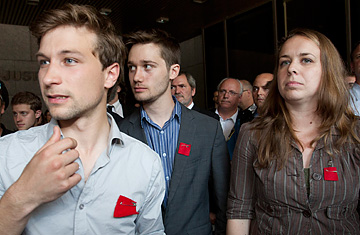
Student leaders, from left, Gabriel Nadeau-Dubois, Leo Bureau-Blouin and Martine Desjardins stand outside the courthouse after filing two motions challenging Bill 78 in Montreal, Canada, on May 25, 2012.
Early summer in Montreal always brings with it the Jazz Festival, Sundays spent lazing on the mountain that gave the city its name and an audible rejoicing. But not this year, as the familiar routine has collided with unprecedented skirmishes between police and protesters. That the downtown core is finally snowless is far less striking than the fact it has become clogged with demonstrators, primarily students, who maintain a rigorous schedule of marches. Every evening they alter the regular soundtrack of the season, shouting slogans and banging pots and pans in what has become the longest, and also the loudest, strike in Quebec's history.
These scenes of unrest and outrage such as Montreal has never seen have now been repeating themselves for more than three months. The protests can be traced back to a tuition proposal put forth by Premier Jean Charest's Liberal government, which would raise post-secondary fees by 82%, or about $1,700, over five years of schooling. But in recent days, demonstrators have focused instead on the emergency legislation adopted last week by Quebec's National Assembly. Bill 78 requires that the organizers of protests — gatherings of 50 or more people — submit their route and other details to authorities for approval eight hours ahead of time, and institutes a system of severe financial penalties for transgressors. The law passed 68 to 48 on the afternoon of May 19 — a day that Parti Quebecois leader Pauline Marois, who opposed the bill, deemed "one of the darkest ... in Quebec democracy."
The legislation, which also suspended the current semester for 25 implicated schools, was designed to quell the social crisis. Instead, it provoked a whole new wave of indignation, just as marching students were losing whatever public support they had garnered. A growing number of Montrealers, even Montrealers on the government side of the tuition debate, view the vaguely-worded Bill 78 as draconian. Since its passing, the opposition has only become larger and more diverse. People have begun gathering nightly to participate in what has been dubbed "The Saucepan Revolution," clanging their cookware in echoes of those who opposed the Pinochet dictatorship in Chile. Driving in and around the city center during the evening has become nightmarish, owing not only to the blockades, but also the clouds of smoke and burning pyres of orange traffic cones. Demonstrations are increasingly ending in violence.
Last week, the situation escalated quickly. On May 19, protesters launched projectiles and at least one Molotov cocktail at the police. Three days later, on the 100th day of the demonstrations, over 100,000 people turned out, many deviating from the determined route; police dispersed the crowd with tear gas and batons. The following evening, the 30th consecutive night of protests, 518 people were detained following a relatively peaceful march that lasted a few hours. Rows of riot officers blocked the demonstration from moving forward, snaring the crowd in a "kettle," as demonstrators chanted, "Let us disperse!" One officer pulled a trio of sizeable rocks out of his pocket before a camera crew broadcasting live as evidence of protester violence. In one night, more arrests were made than during the entire 1970 October Crisis, when the War Measures Act was invoked and the police vested with special powers. Many of the detainees will face $634 tickets.
If the protests have now transcended the initial tuition dispute, they have also moved beyond Montreal's borders. Elsewhere in the province, from Granby to Jonquiere, people are playing the percussions with their kitchen implements. Solidarity events have been held in Toronto, Calgary, Vancouver, France and New York, where one gathering was organized by the Occupy Wall Street movement. The Canadian Federation of Students plans to call an Ontario-wide strike in the fall in support of Quebec students. Members of the Arcade Fire appeared on Saturday Night Live donning the square red patches that are the protesters' calling cards, effectively bringing the action to mainstream television. Michael Moore has made a statement via Twitter.
But though the conflict has outgrown the student movement, it will not end until the students desist. Which is why, following the turbulence of May 23, the Charest government invited four main student factions to participate in official talks. Meanwhile, Gabriel Nadeau-Dubois, the feisty 21-year-old spokesperson for the Coalition large de l'association pour une solidarité syndicale étudiante (CLASSE), the militant group that initiated the strike, has called for summer-long protests. One section of Bill 78 stipulates that a student federation could be fined up to $125,000 per day if it prevents pupils from attending classes. But Nadeau-Dubois says he intends on doing just that — taking all "necessary means" to enforce strike mandates — when school starts up again in August. At a recent press conference he called the law "unacceptable" and "probably unconstitutional." Already student groups have filed a court challenge seeking to strike the bill down.
